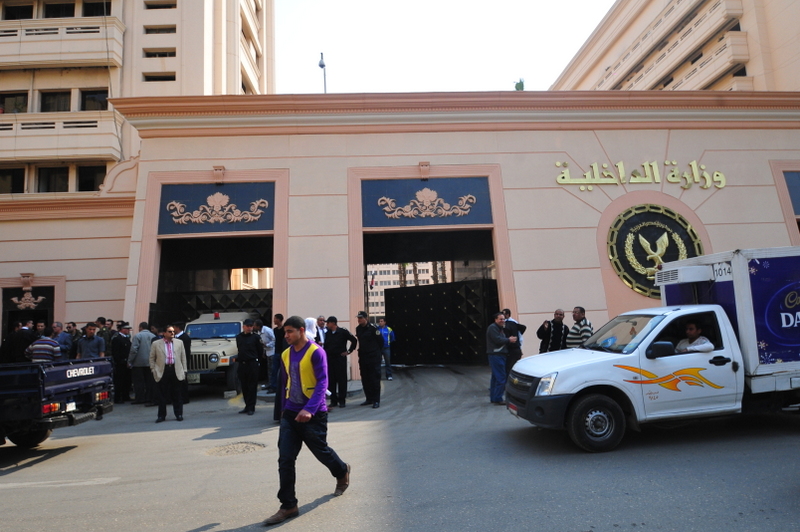By Amira El-Fekki
Detainee Asmaa Abdel Aziz, a mother of two, was among 100 political prisoners pardoned by President Abdel Fattah Al-Sisi on 23 September, during Eid Al-Adha, and ahead of Al-Sisi’s attendance of the 70th United Nations General Assembly.
However, local NGO Al-Haqanya Law Centre reported that Abdel Aziz remains in Al-Qanater Prison. Lawyer Sara Rabee of the centre was reportedly told by prison authorities that “there was no deportation vehicle to take her to the prosecution office, in charge of enforcing the pardon”.
For her part, Rabee responded by saying that such a task falls under the responsibility of the prison authority, but in vain. “As such, we established that the prison authority is obstructing the release of Abdel Aziz,” the centre stated in a Tuesday statement.
Asmaa Abdel Aziz has a chronic medical condition, documented by the official state health insurance authority since 2010. She has two sons, aged 19 and 14. “The problem is other pardoned prisoners were released directly from the prison, while in Abdel Aziz’ case they want to deport her first,” Al-Haqanya Director and human rights lawyer Mohamed Abdel Aziz told Daily News Egypt.
“There is no mercy, not even for her condition,”Mohamed Abdel Aziz said. “Despite the joyful atmosphere surrounding other released prisoners, we must not forget those who remain behind bars,” he added.
The presidential pardon clearly stated that it included detainees of political cases who received irreversible court verdicts, sparing them the remaining jail periods. It also said that some prisoners were pardoned due to their health conditions, and shortly thereafter, it was reported that the Ministry of Interior was ordered to release them on the same day so that they could spend Eid Al-Adha at home.
Meanwhile, Mohamed Hossam ‘Kalousha’ and Mamdouh Gamal were finally released from Tora Prison on Tuesday, on the grounds of the presidential pardon granted the previous Wednesday.
According to the Association of Freedom of Thought and Expression (AFTE), whose lawyer Mokhtar Mounir followed up on the cases, the two were defendants in the Shura Council trial.
Kalousha and Gamal’s trial session is scheduled for 1 October. AFTE reported that the court also ordered investigations of the people responsible for not responding to the defence’s demands in previous sessions, which included calling eyewitnesses to testify in court.
AFTE’s timeline report on the case dates back to April 2015, with over five court postponements, one of which was due to the absence of the defendants from the trial. However, their attendance is conditioned by prison authorities transferring them to court, as they were already imprisoned in the Shura Council case.
Commenting on the status of pardoned prisoners Wednesday, Mokhtar Mounir told Daily News Egypt that the Ministry of Interior has been intransigent towards prisoners on several instances. “One of the strongest examples was the Shura Council prisoners,” he said.
“Technically speaking, the case of Kalousha and Mamdouh was the most difficult, because the Ministry of Interior did everything within its power to keep them jailed,” he added, also claiming that the ministry “forged” a date on official papers in an attempt to bar their release.
The complication in their release procedures came from another case that was brought against the two while in detention, reportedly for disputing with a policemen in prison. Court reports for the case, however, did not order their detention pending trial in the case.
“Despite initially claiming that their release could not be executed due to their detention pending another case, the Interior Ministry received a copy of a release validation document from the prosecution on 22 September 2015, one day before the pardon was issued,” Mounir explained.
The human rights lawyer further pointed to other obstacles facing some pardoned prisoners that the Interior Ministry intentionally used against them, as he claimed. Those included legal alternatives for Moamen Abdel Tawab and Nahed Sherif ‘Bebo’.
“A spelling mistake in Salwa Mehrez’s name was not a big deal, especially as it had been correctly published in the official state gazette. Likewise, it was logically unacceptable, in the case of Abrar Al-Anany and Menna Mostafa, to say that a court session to appeal their verdict has been scheduled,” he continued.
Mounir, among other lawyers, suggested that the Ministry of Interior had interfered with the presidential decision, and abused powers outside its authority, in violation of the law. “By law, presidential pardons are effective immediately, which the Ministry of Interior did not respect,” he said.
“I believe that the Interior Ministry was not welcoming of the pardon decision, so they did their best to delay the release of those they could find excuses for,” Mounir concluded.
Daily News Egypt contacted the Ministry of Interior’s media office, which declined to comment on the matter.

